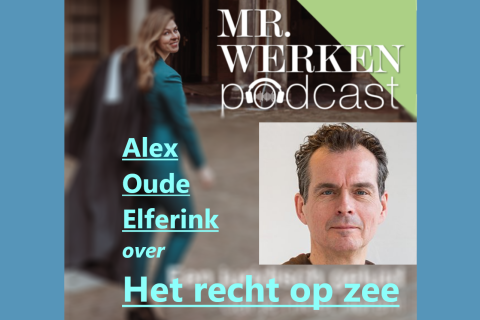Alex Oude Elferink in podcast about maritime law
Regulations on fishing, wind farms, cables and pipelines

A new episode of the Mr.Werken podcast (in Dutch) is about maritime law. Alex Oude Elferink, professor of international law of the sea (associated with the Netherlands Institute for the Law of the Sea and the Utrecht Centre for Water, Oceans and Sustainability Law) talks about his subject area. "There is enough regulation, but a lack of political will to come to implementation," he says about enforcement and management of international waters, among other things.
Oude Elferink explains the different zones into which the sea is divided - the territorial waters, the Exclusive Economic Zone (EEZ) and the 'high seas' beyond – and what jurisdiction coastal states posess and how they can exercise it. "Within the EEZ, there is freedom of navigation and also freedom to lay cables and pipelines. In particular, laying internet cables is of course a very important freedom today. That explains why the rights of coastal states beyond their territorial waters are limited, because of the interests of the international community, so you don't have to ask permission from all individual coastal states."
Another topic is the UN Convention on the Law of the Sea (UNCLOS) and how difficult it is currently proving within that framework convention to reach agreements between states on better protection of biodiversity within delineated zones of international waters. Oude Elferink argues that – in line with the increasing 'climatisation' of law currently underway – an 'oceanisation' of law would also be a good thing; after all, some two-thirds of the Earth's ecosystem is involved. "There is enough regulation but a lack of political will to come to implementation. In the Law of the Sea Convention, there is a whole chapter on technology transfer and capacity building of developing countries, but those agreements are worded in very general terms, and in practice little has come of it."
Speaking of the negotiations in the UNCLOS context, as far as he is concerned, the rules may be tightened, even if that would result in fewer countries being on board. Because then at least there would be a good yardstick, which could have an indirect effect on non-participating parties as well. "What the Law of the Sea Convention currently lacks is a Conference of the Parties, which can take decisions, and many people see that as a shortcoming. Within a new treaty, there would be such a COP, but the negotiations for it are very difficult, and there is a perception that – as one gets closer to a concrete text – it gets watered down anyway, and originally conceived obligations are come back upon."
The podcast was created by contract and corporate law lawyer Liza Stellingwerf (see Mr.WerkenPodcast) and can be listened to via Spotify

